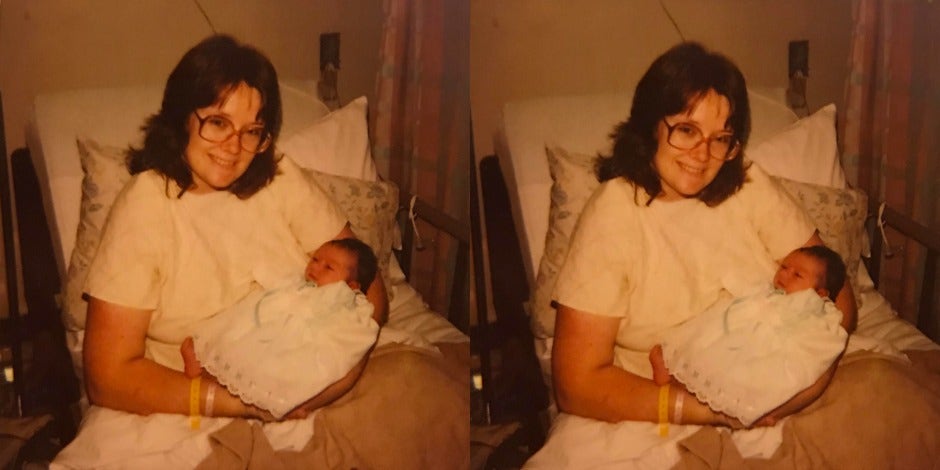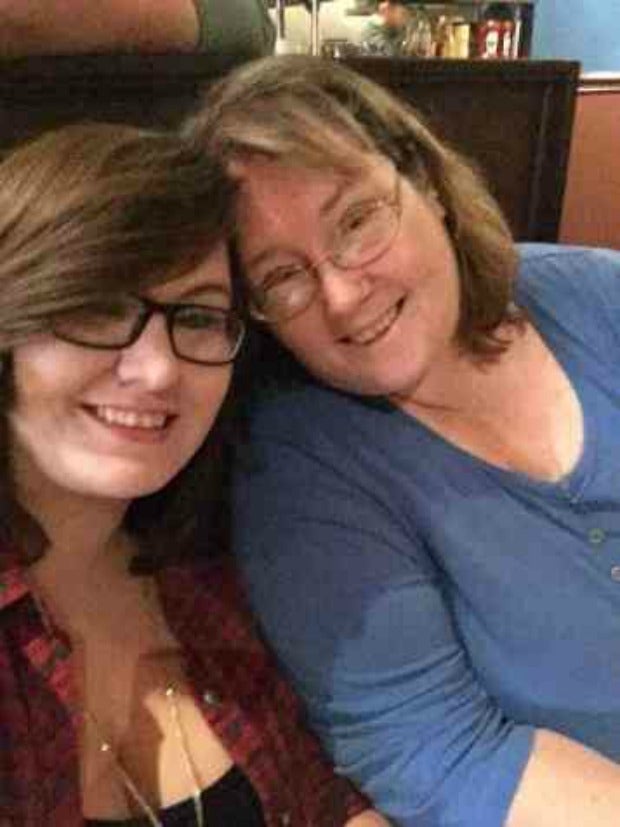Donating Your Body To Science Can Help Save Lives — Unless You're 'Too Fat'
Nobody would honor my mom's last request.
 courtesy of the author
courtesy of the author My mom died.
I don’t say this to garner sympathy, but rather because the more I state it as a fact, the easier it becomes to accept it. She was only 56. It was likely a heart attack, and yes, it was very unexpected.
In all the to-do lists I forced myself to complete over that long, awful week after she died, the one task I hadn't properly prepared for was figuring out what we were supposed to do with her actual body.
My dad and I knew her final wish had been to have her body donated as a medical cadaver in order to help further research and education. But when the time came, we had no idea how go about to donating her body to science.
Naively, we'd thought once we informed the hospital that she wanted to participate in body donation to a medical school or research facility, they would just ... take her. Like an organ donation, we thought we just needed to sign a consent form and mom would be wheeled away to an anatomy classroom on a gurney.
The truth is, the process is a lot more complicated than that, and the issues we faced were compounded by the fact that no one wanted my mom’s cadaver — because she was too fat.
Let me back up a little.
My mother would rise up from the grave to haunt me if I publicly announced how much she weighed, but suffice it to say, she struggled with her weight her whole life. To make matters worse, she'd spent much of the last year of her life sitting on the couch due to a multiple-fracture ankle break, gaining even more weight before her death.
But my mom was hardly alone in that. America is getting bigger.
According to data collected by the Centers for Disease Control, 39.8 percent of adults in the U.S. were considered obese ("defined as BMI greater than or equal to 30.0, based on the NHANES variable Body Mass Index") as of 2016, with 71.6 percent considered overweight or obese ("defined as BMI greater than or equal to 25.0"). This is a significant increase from the 22.9 percent considered obese and 56 percent considered overweight or obese as of 1994.
And yet, many doctors don’t seem to want to see or learn how to treat fat people. Fat-phobia in the medical community is a real and well-documented phenomenon.
And while I could write a whole article on weight bias in healthcare, I’ll save it for another day and simply say this: many doctors treat fat people differently ... if they treat us at all.
At the same time, medical cadaver programs have traditionally struggled to find donations.
Paying for a dead body is illegal in the United States, so these programs have to rely on volunteers who either sign a bequest while still alive or whose next of kin or legal conservator may make a donation following their death (laws vary by state within the U.S.).
According to The Living Bank, a cadaver and organ donation program that just celebrated its 50th anniversary in 2018, “Whole-body donation helps medical researchers and doctors to research and identify better ways to treat a comprehensive range of illnesses and conditions. Whole-body donors contribute to advances in medical and physician training; development of surgical procedures; treatment breakthroughs in areas such as gynecology, colon and liver illness, diabetes, and HIV; improved understanding of how diseases progress; development of life-changing medical devices; cancer protocols; treating spinal injuries; and enhanced drug delivery mechanisms."
My mom wanted to help. She wanted to be one of those people who did some good after she was gone.
But if you’re fat, you can't.
When I was a little girl, she once told me that when she died, her body would just be the shell of who she once was, and we should try to help others with it. I never forgot that lesson or her wishes.
Neither will I ever forget my father walking away from my mother’s body for the last time.
One of the last things he said to her was, “Goodbye. Go teach a medical student a thing or two.”
In my overwhelming grief, and with increasing frustration, I struggled to fulfill her final wishes.
I wound up calling four different cadaver programs in Northern California, where we live, desperately trying to find someone who would accept her body for a study or a class.
Each and every time, her donation was turned away because of her weight.
It was the ultimate fat-shaming experience. No one even wanted to look at her dead body. It felt like we were stymied again and again by arbitrary, sizeist requirements.
I was told over and over that medical cadaver programs will only accept donations of bodies weighing less than 250 pounds and under a certain height. One woman even got us halfway through an extremely long application process, only to hear my mother’s weight and immediately end the conversation.
“I’m sorry but we can’t accept this donation,” she told us and quickly hung up.

The author with her mother
I spoke with Aron Davis, PhD, director of the University of California, Davis Body Donation Program, one of the largest in the state, to find out why.
Since 1969, the program at UC Davis has accepted cadavers, distributing them among University of California and California State University campuses, as well as to community colleges, private colleges, research labs and private medical companies.
“We do have an upper weight limit of 250 pounds,” Dr. Davis said. “We can bend that rule right now because we have a bariatric study going on in San Diego.”
The modified weight limit for that study? 280 pounds.
Davis explained that it’s mostly a matter of safety for technicians handling the bodies, and partially a problem of supply and demand.
First of all, a body that weighs over 250 pounds, he said, just isn’t safe or easy for a single lab technician to move on their own, and they rarely have the right equipment rated for heavier bodies.
“Embalming also adds weight,” he said, though how much depends on the body. And while a funeral home would only add enough embalming fluid to keep the body preserved for a few days or weeks until the funeral, he said, a medical cadaver needs enough to keep them preserved for years.
As explained on Owlcation, "Body donation programs frequently set height and weight limits (e.g., under 6'4" and 300 pounds) ... because embalming can easily add up to 100 pounds to the corpse's weight. Technicians find it difficult to lift and maneuver large bodies, and large corpses may not fit well on the metal storage trays."
“It’s difficult to handle (larger bodies) with staffing and time restraints,” Davis said.
Second, there has to be a request for larger bodies.
And as reported by Vice, "Dissection is also made more difficult when a cadaver carries more fat — the dissector has to cut through the layers of fatty tissue to reach the body's organs."
Most anatomy classes are short on time, Davis explained, and smaller bodies can be dissected more easily and quickly by first-year medical students using the cadaver to learn about anatomy. A larger body means more fat tissue, and that takes more time to cut through.
So, one part of the problem is that the studies going on just aren’t focusing on fat people, though Davis said he’s seen a small shift in requests for larger cadavers, and some coroner’s offices are switching over to cots that can accommodate more weight.
There was one additional option I was told about only after I finally broke down and cried on the phone to the woman at the fourth cadaver program I’d called that day.
“I don’t know what to do,” I sobbed into the phone.
“Have you considered a forensic body farm?” she asked gently.
If you don’t already know what that is, think back to the most gruesome decomposition scene from CSI that you can remember. It’s a little something like that.
“We are a facility that studies the process of human decomposition,” said Alex Smith, a lab manager at the Colorado Mesa University's Forensic Investigation Research Station (FIRS). “We use that information [so we can] contribute to death investigations, and educate students to be able to work in varying areas of forensics.”
Best of all, the weight limit for donating your body to science via FIRS maxes out at around 500 pounds.
The bad news for us is that Colorado Mesa University is the westernmost forensic farm out of only about seven in the entire country, and still more than 900 miles from the location of my mom’s body at the time. While the university will take care of the transportation process within a 75-mile radius, 900 miles is a bit too far.
As stated on their website, "Donors with an infectious disease or who exceed the weight limit who still wish to donate may do so by choosing to have their remains cremated. Cremains provide an invaluable learning resource. People choosing this option should contact us prior to making arrangements. This allows us to work with the crematory involved to ensure the remains are not pulverized."
However, "The family must assume responsibility for the arrangement and cost of cremation."
At the end of the conversation, I did feel better knowing they would have taken her body and that we could have fulfilled mom’s wish to be useful to the medical community that had shamed her for her weight not only during her life, but now in death, too.
In the end, my dad and I decided to go with cremation, which was comparable to the cost of shipping mom’s body to Colorado in a special box for unembalmed bodies.
This way, too, we have her still with us. Neither FIRS nor the UC Davis cadaver program returns remains after they have been studied, though some cadaver programs do.
The most important thing to note, though, is that medical donation is an option for handling a body after death.
It's also typically more affordable than burial or cremation, as it is usually done at no cost to the family.
I have no happy ending to this story.
My mom is still dead.
Fat people are still being shamed and ignored because of their weight in doctor’s offices across the country.
My words here won’t make a difference as to what studies are being done in labs and classrooms across the state.
And perversely, I still think body donation is a wonderful final gift, even if it wasn't one we could help my mother give.
I do hope, however, I may save another family from the heartache, pain, and confusion we went through during the worst days of our life.
A lot of that could have been saved if we’d done our homework ahead of time, before my mom died.
Please still consider donating your body to science.
Just know that when it’s your time to go, they may not take you.
Robin Epley is a journalist and editor from Northern California whose work has appeared on sites like Bustle, HelloGiggles and TechWire, and in regional publications such as the Sacramento Bee. She also founded Drunk Austen, a community of feminist book nerds who like to drink.

